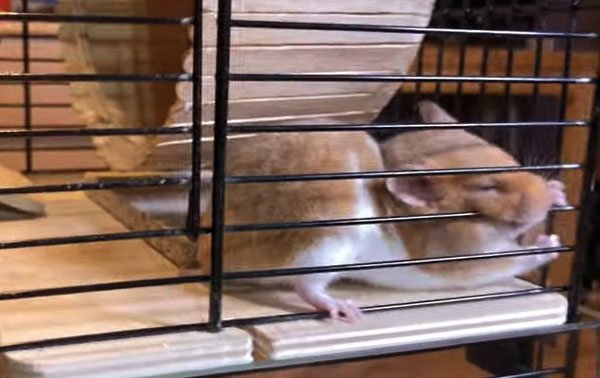Why Is My Hamster Biting The Cage? Is This Behavior Normal And Healthy?
Like other rodents, hamsters have strong incisors they use to nibble or gnaw on nearly anything they come across. But nibbling the cages has consequences. You need to find out the reason behind this and take action accordingly.
So, why is my hamster biting the cage? Your hamster may bite the cage because it is bored, anxious, or even stressed. Sometimes, it may chew the cage bars to sand its teeth down, which are constantly growing. Also, some hamsters bite the cage as a pastime or just because another rodent is doing the same.
So then, how do you stop your hamster from biting the cage? Stay right here to find out this and much more, including if there are any dangers of your rodent chewing the pen.
Why Is My Hamster Biting The Cage?
Similar to other rodents, hamsters are naturally curious animals and love to gnaw and nibble on all sorts of things. However, biting the cage could mean many things. Let’s find out.

1. Boredom
Hamsters are naturally active and playful rodents. Therefore, they cannot sit quietly in one place for extended times. As such, these rodents may need more entertainment to avoid getting bored quickly.
And one way a hamster may try to entertain itself is by biting the cage’s bars. This behavior helps keep them mentally and physically stimulated.
2. Stressed and Anxious
One of the common signs of your hamster being stressed or anxious is biting the cage. This may happen when your hamster is still new in your house, which is an unfamiliar environment. Your rodent may also get stressed when you buy a new cage or due to:

- Loud noises in the house
- Rough handling
- Sudden movements from humans
- Staying in a dirty or small cage
- Poor diet
3. Sand Down Teeth
Your hamster has incisor teeth that grow throughout its life. Because of this, your rodent must continually grind its teeth down to prevent them from growing dangerously long, causing injuries.

If you don’t give your pet rodent something to constantly gnaw on, including hard food, your hamster will chew anything. This includes biting the bars of its cage.
4. Small Cage
Sometimes, your hamster may bite its cage in an attempt to escape. This occurs if the enclosure is too small and there is no other obvious way to get out of the cage.
5. Favorite Pastime Activity
Additionally, your hamster may bite the cage because it is one of its favorite pastime activities. You may notice this behavior, especially during your rodent’s playtime.
Below is a video of a Syrian hamster in a big cage with lots of toys but still chewing its cage bars:
6. Mimicking Another Hamster’s Behavior
Interestingly, your hamster may learn this behavior from another hamster. This happens when you already have a hamster that often bites its cage, and you get another one. The chances of the new hamster also biting the cell will be high.
7. Attention Seeking
Like most pets, hamsters also thrive on human interaction. They also like to be handheld and cuddled, but occasionally. Therefore, if you rarely interact with your pet rodent in the house, it may bite its cage to get your attention.
What are the Dangers of Biting The Cage for My Hamsters?
Cage biting is not a healthy behavior for your hamster. It may lead to various problems, such as:

Broken or Misaligned Teeth
Because of the hard materials used to make the cages, your hamster may break off its teeth while biting the bars. Now, besides being painful, the broken teeth may fail to grow back or could grow misaligned.
Facial Injuries
While biting the cage, your hamster may also rub its face on the bars. As a result, this may lead to facial injuries, including sores on the nose and mouth.
Choking
Wire cages for hamsters have plastic coatings. If your pet rodent bites the cell, the coating may come off and even choke your hamster.

Intoxication
Also worth mentioning is that some cages are painted. Therefore, if your hamster constantly bites the pen, it may suffer from intoxication over time from ingesting the paint.
Escaping
While wood and plastic cages are attractive options, your hamster may chew through them over time. And as a result, your rodent could escape, never to be found.
How Do I Stop Hamster From Biting The Cage?
Because of the many dangers of your hamster biting the cage, knowing how to stop the behavior is critical. Below are tips to help you.

Offer Plenty of Exercises
One way to stop your hamster from biting the cage is to keep your pet mentally and physically stimulated through exercises. This will help prevent boredom and anxiety problems at night when they are active since your hamster is a nocturnal animal. You can do this by providing the following:
- Lots of toys, including an exercise wheel and ladders
- Plenty of playtimes outside the cage
- A home gym with many obstacles
- Puzzle toys
Keep the Cage in a Quiet Room
Your hamster may get stressed due to staying in a noisy environment. Therefore, if you have small kids, make sure to put the cage in a quiet room away from the noise.

Get a Bigger Cage
The minimum cage size for a hamster is 450 square inches of floor space, whether you have a dwarf or Syrian hamster. But of course, the bigger, the better, especially if you have a Syrian hamster, as it is bigger than other breeds.
Give Chewing Toys
To help your hamster wear down its teeth without biting the cage, give him lots of things to chew on. You can provide your pet with something like:
- Paint-free wood
- Garlic-free dog treats or unsalted hard-shelled nuts
- Rolled cardboard
- Popsicle sticks or apple branches
FAQs
In this section, we will respond to commonly asked questions about why my hamster is biting the cage. Check them out.
Q: Is it normal for hamsters to bite the cage at night?
Yes. Hamsters are nocturnal animals. This means they sleep during the day and are active for most of the night like other rodents. And since these pet rodents love to gnaw on things, biting the cage at night is no exception.
Q: Do hamsters bite the cage when scared?
No. Typically, hamsters bite their owner or anyone else when scared, not the cage. They do this as a defense mechanism. However, these pet rodents may chew the cage bars if stressed, anxious, or nervous.
Q: Can punishing my hamster stop him from biting the cage?
No. In fact, it would be cruel to do so since hamsters don’t understand the concept of punishment like most animals. Instead, you should provide your pet with a healthy diet, a spacious cage, and many chewing toys to keep it active.
Conclusion
Your Syrian, Dwarf or Chinese hamster may bite the cage when bored, stressed, or anxious. However, your rodent may sometimes bite its pen to sand down its teeth or get your attention.
While biting the cage is typical with hamsters, this behavior is unhealthy. Your pet rodent could break teeth, choke on small plastic coatings, or suffer from intoxication. Even worse, your pet could bite through the cage bars and escape. Fortunately, there are many ways to stop this behavior, like getting a giant cage and providing a variety of chewing toys.




